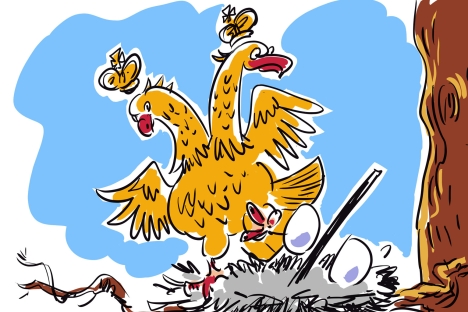Economic uncertainty quadrupled


Click to enlarge the image. Drawing by Alexei Yorsh
Global economic uncertainty affects Russia in two ways. First, export prices for gas, oil and other exchange commodities are jeopardized due to uncertainty in economic growth globally. This not only affects the largest Russian companies - Gazprom, Rosneft, Evraz and others - but also the government, because royalties from oil and gas are important for the budget.
And second, financial markets remain highly volatile - with investors ready to flee at the faintest sign of trouble. While multinationals such as Siemens and General Electric with substantial investments cannot leave the country overnight, investors in financial markets can always retreat to their domestic markets.
Making things worse for Russia is its lack of large national institutional investors. Since the collapse of communism, it has not had the time to establish major pension funds or insurance companies.
The government is trying to fight the weaknesses of these institutions, but so far this task has proved too hard.
Related:
Moscow to hire international consultants to help improve its ratings
A similar story is unfolding with the declared strategy to turn Moscow into an “international finance center.” Many initiatives have been launched, and some, such as the setting up of the joint MICEX-RTS exchange and the Central Securities Depository, have been completed.
As a result, within five years Moscow may become a financial centre for the CIS - Ukraine, Kazakhstan and other ex-Soviet states. But talk of turning Moscow into another London or New York remains fanciful.
Prospects look better for Russian banks. With loan portfolios growing on average 10-20 percent annually, asset growth is strong and yields are high.
The banks have also been more cautious since the onset of the global financial crisis in 2008, which is good as they were too aggressive earlier.
Their position, however, needs further strengthening, particularly in areas such as risk, finance and budget management, and capital planning.
High yields for banks, however, mean that loans are expensive for companies as banks remain apprehensive about lending in today’s uncertain market conditions.
Nonetheless, expanding corporate credit and diversifying lending to more large, small and private business will be crucial for long-term development.
Two other challenges for banks are the dangers of currency risk for those that use dollar loans to lend in rubles and how best to lower the interest rates paid on deposits opened when inflation was high.
Offsetting both these problems is the fast rate of ruble-deposit growth - 22-23 percent annually for the last three years. This has strengthened the banks’ ruble holdings, so lowering demand for dollars, and reduced the proportion of high-interest deposits in their portfolios.
Geoffrey Nicholson is a partner at PricewaterhouseCoopers.
All rights reserved by Rossiyskaya Gazeta.
Subscribe
to our newsletter!
Get the week's best stories straight to your inbox